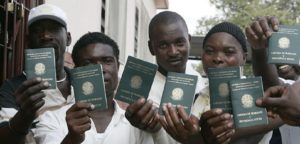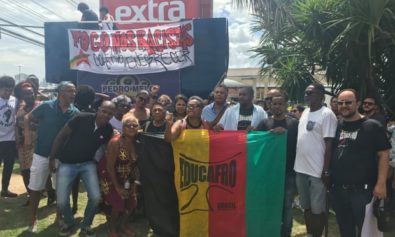
Haitian immigrants show off their Brazilian passports. (Photo via Borgen Magazine)
Manaus, Brazil — Halfway through the Olympic torch relay — a spectacle designed to unite Brazil behind Rio 2016 — torchbearer No. 35 lifted the flame to cheers of “Haiti! Haiti!”
Abdias Dolce, 28, was one of thousands of Haitians who arrived in the Amazonian city of Manaus after the devastating 2010 earthquake in their country that killed more than 200,000.
He had been studying in Port-au-Prince when the disaster struck and said the impact of the quake led to him traveling south to build a new life and restart his studies in Brazil.
Five years later, he received the Olympic flame close to where he was first welcomed and given shelter by the Sao Geraldo parish church in central Manaus, receiving a warm reception from the crowds on the street.
“I don’t just represent Haitians but all immigrants, not only those in Brazil but outside of Brazil as well,” he said afterwards.
“Brazil has made a big step to include my name on the list of those who carry the Olympic torch. Because the biggest problem with immigration today is the inclusion of immigrants in society.”
As the United Nations reported an unprecedented number of people displaced from their homes — one in 113 people in the world — migration and asylum has once again come under the spotlight.
“We had people waiting at the port with Kombi vans,” Valdecir added. “They didn’t even need to ask where they were going.
“There were more than 100 Haitians in the main room. They took over everything. It was crazy.”
He said state and local government efforts to help fell short, with many Haitians relying on the church while they found work and homes, either in Manaus or elsewhere in Brazil.
By 2015, the government said that it had granted permanent residency to almost 44,000 Haitian immigrants.
“This act reaffirms Brazil as a welcoming nation, a nation open to all those who want peace and are willing to work and live with our people and share the construction of our country,” said Miguel Rossetto, then labor and welfare minister.
Abdias, who moved to Manaus in 2011 and eventually brought with him his now wife, said the biggest problem was not the Brazilian government, nor its immigration policies but its media, which reinforced prejudices against immigrants.
Read more here.


